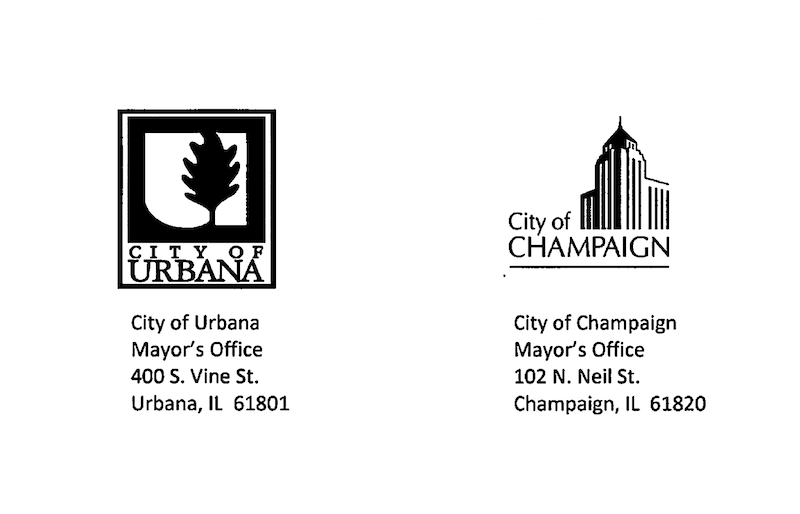Both Mayor Deb Feinen of Champaign and Mayor Diane Marlin have penned a joint letter to state legislators, explaining that the state’s budget stalemate is having on Champaign-Urbana and the urgency for a solution.
Read the full letter below:
OPEN LETTER TO STATE LEGISLATORS
REGARDING MUNICIPAL REVENUES AND THE BUDGET
FROM THE MAYORS OF CHAMPAIGN AND URBANA (JUNE 21, 2017)
PUBLIC WORKS – MCORE (Transfer and Pass Through Funding)
Without passage of a State budget by June 30, automatic transfers to transit agencies and local governments will end. Any cutoff would damage mass transit service and halt many local road projects, in particular the MCORE Project in Champaign-Urbana, which is federally funded via grant money that passes through IDOT.
As you know, these infrastructure projects take years of planning before they can become a reality. The best example locally is the $42 million Multimodal Corridor Enhancement (MCORE) project now underway in Champaign-Urbana.
This reconstruction project will transform the University of Illinois campus by adding complete streets that will be safer and more efficient in accommodating pedestrians, bicyclists, and bus and vehicle traffic.
MCORE was made possible thanks to a $15.7 million federal TIGER grant, with the UI, Champaign, Urbana and the Champaign-Urbana Mass Transit District picking up the remaining $27 million cost.
Two of the five MCORE projects are now underway: reconstructing Green Street in Urbana between Wright Street and Busey Avenue ($9 million cost) and reconstructing Green Street in Champaign between Fourth and Neil Streets ($11 million cost).
These MCORE projects are on a tight timeline and were already slated to take two years to complete. What makes any shutdown particularly concerning is that work is currently occurring in front of the Illini Union, with a scheduled August 25th completion date, three days before the fall semester begins. If this project segment isn’t completed on time, there will be no vehicle access — particularly for buses at the busiest boarding and alighting stops that occurs on campus. This would impact literally thousands of students, faculty and staff.
In addition, the lack of State funding means that construction – and the disruption it causes – could possibly extend this project into a third year. That is simply unacceptable.
ALLOCATION OF REVENUES AND LOCAL GOVERNMENT DISTRIBUTIVE FUND
The Cities remain concerned that the Legislature will seek to change current revenue sharing allocations by diverting long-standing revenues from local public entities to the State.
We are in particular concerned for local school districts, which depend heavily on State funding and property taxes, as well as for other local governments, including Champaign County and the Cities.
As you recognize, the Cities use revenues received from the income tax through the Local Government Distributive Fund to help pay for public services like police and fire protection. A major reduction in this very important revenue source would almost certainly result in a reduction in local services.
FREEZE ON PROPERTY TAX
There has been legislative discussion about some type of freeze on property taxes. While understandably appealing to local homeowners, a property tax freeze could have negative impacts on local government.
For example, township government in both Cities provides General Assistance to poor childless adults who don’t qualify for federal assistance programs. Township government is almost entirely funded by property taxes.
The Cities rely on property taxes to fund Police and Fire pensions and our City libraries.
We have adequately funded our local pension plans over the years through good stewardship, but freezing property taxes would make it more difficult to continue this practice without diminishing other City services.
IMPACT ON STATE CONTRACTS WITH THE CITIES
The State currently pays the Cities to maintain various parts of the State transportation infrastructure, e.g. traffic lights. The Cities will continue to maintain these critical aspects of the State infrastructure, but this will negatively impact other aspects of maintenance in the Cities.
Additionally, for example, the Cities performs JULIE locates in the cities on behalf of the State and street sweeping. Failure to fund the State’s obligation would damage our financial situation and our contractual relationships with the State.
FUNDING FOR SOCIAL SERVICES
Our local social service providers, as you know, are struggling. These organizations provide vital services to people who need our help. Lack of a State budget means these people are being hurt. Please recognize that you have a moral obligation to provide continuing funding for the social service organizations in our Cities and the rest of the State.








